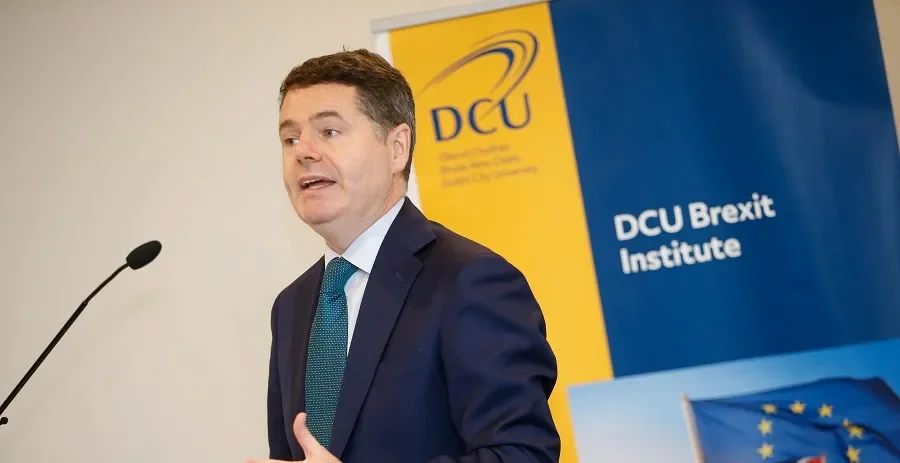

Minister Paschal Donohoe addresses DCU Brexit Institute
Paschal Donohoe TD, Minister for Finance, Public Expenditure and Reform, addressed DCU Brexit’s Institute earlier today at an event entitled ‘Brexit, the Irish Economy and the Future of European Fintech’.
Marking the third year since its launch, Minister Donohue remarked that the work being carried out by the DCU Brexit Institute was “a very positive contribution to the study of what is often seen as a wholly negative challenge.”
His keynote covered our future relationship with the UK, the Budget 2020 strategy being adopted to ensure we have the resources we need to meet the challenges ahead and the importance of the backstop.
In reiterating the Taoiseach’s comments to British Prime Minister Boris Johnson last week, he said: “The story of Brexit does not end if the UK leaves…instead we just enter a new phase.”
“And whether there is a deal or whether there is no deal, we will still be faced with very many of the same issues.”
“There will be difficult discussions and even more difficult decisions to be made on tariffs, customs, quotas, product standards, State Aid, minimum standards for the environment, workers’ rights, visa regimes and, not forgetting, fishing rights, aviation landing rights between UK and EU, including Ireland and many other issues across many sectors of activity.”
Speaking on the implications for the protection of the single market on this island if the UK were to pursue a policy of regulatory divergence from the EU, Minister Donohue, outlined the economic response to such a choice should be to
“Double down on our membership of the single market while working with our partners to deepen and expand it; maintain our focus on enhancing the productive capacity of our economy through the Future Jobs programme; and continue to invest in critical public infrastructure across the economic cycle.”
On the topic of preparing the economy for Brexit, Minister Donohoe said:
“The medium and long-term challenges are significant. But, of course, we are understandably focused on the immediate challenges. In reflecting on them, it is important to recognise that the economy is in a much stronger position to respond than it was on the eve of the 2008 financial crisis.”
“Government are taking steps to boost the resilience of Irish economy by; Balancing the Budget; Reducing our debt burden; Developing the Project Ireland 2040 capital investment and regional development plan; Establishing the rainy day fund.”
Speaking about safeguarding peace in Ireland through the proposed Backstop, Minister Donohoe commented:
"It is clear that a no-deal Brexit is bad for everyone on these islands, and everyone involved is working very hard to avoid that. It is equally clear, as Arlene Foster has said in the past, that a solution has to recognise the unique geographical and historical situation of Northern Ireland. In the spirit pf the Good Friday Agreement, we are working to reconcile the interests of both unionism and nationalism. In the absence of a solution, our work with the European Commission has intensified with the goal of at least avoiding physical infrastructure at the border in the event of a no deal Brexit,"
This keynote was followed by a panel discussion on the topic of Fintech, moderated by Samantha Samantha McCaughren, Business Editor, Sunday Independent.
The panel featured Deborah Hutton, Partner, Evershed Sutherland Ireland; Lory Kehoe, Managing Director, ConsenSys; Dr Pierangelo Rosati, Professor in Business Analytics at DCUBS and Director of Industry Engagement at the Irish Institute of Digital Business; and Mark Harris, Head of Technology, Media & Telecoms at AIB.
